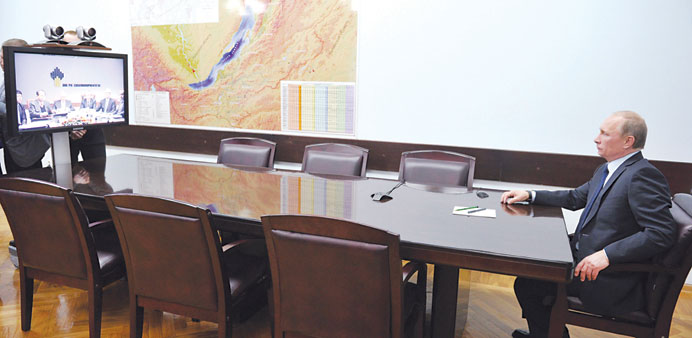Russian President Vladimir Putin speaks to ExxonMobil and Rosneft officials in the Pacific island of Sakhalin during a video conference with Yuzhno-Sakhalinsk in Ulan-Ude in the Republic of Buryatia yesterday. Rosneft and ExxonMobil have agreed to study the possibility of building the plant to liquefy gas from their joint Sakhalin-1 oil and gas project off Russia’s Pacific coast.
|
Rosneft and ExxonMobil yesterday unveiled details of a $15bn liquefied natural gas project to supply Asia-Pacific markets that would challenge Gazprom’s monopoly on Russian gas exports. |
The Russian and US energy majors have agreed to study the possibility of building the plant to liquefy gas from their joint Sakhalin-1 oil and gas project off Russia’s Pacific coast.
Rosneft President Igor Sechin, a long-time ally of President Vladimir Putin, told the Russian leader by video link from Sakhalin that the LNG plant could either be built on the island or in the far-eastern region of Khabarovsk.
Production could start in 2018 - the same year that Gazprom plans to commission its own LNG plant near the Pacific port of Vladivostok - pitting the state energy giants against each other in a battle for market share in China, Japan and South Korea.
“We are talking probably about $15bn,” ExxonMobil Development president Neil Duffin told Putin, also via the video link from Sakhalin.
Rosneft and South Korea’s STX Corp are in talks over building a fleet of vessels and platforms for Rosneft’s offshore projects, Sechin also said.
Putin reacted with caution to the ambitious plans laid out by Sechin, warning him against “monopolising” Russia’s oil and gas industry.
Only Gazprom, according to a 2006 law, has the right to export gas from Russia. Rosneft is, however, lobbying to win the right to export LNG, as is Russia’s largest independent gas producer Novatek.
Putin so far has balked at moves to liberalise exports of Russian gas, which could expose Gazprom to harsher domestic competition at a time it has lost pricing power and market share in its core European market.
Despite being one of the world’s most profitable companies, Gazprom has come under fire for failing to compete for market share and for over-spending on investments, draining its cash flow and pushing its market value below $100bn.
Gazprom’s weak performance has raised questions over whether it can continue to fulfil the role in projecting Russia’s energy power that it has fulfilled throughout Putin’s 13-year-old rule.
But Putin has stopped short of withdrawing his support for Gazprom, and cautioned Sechin over Rosneft’s aggressive expansion and saying it should not abuse its dominant market position in Russia’s Far East.
“You really occupy practically a monopoly position,” Putin told Sechin.
Sechin took over Rosneft last year after serving as the government’s “energy tsar” and has struck landmark exploration deals with Exxon, Statoil and Eni to exploit Russia’s untapped Arctic offshore reserves.
Last month, Rosneft completed Rosneft’s $55bn takeover of Anglo-Russian oil firm TNK-BP, creating the world’s largest listed oil firm producing the equivalent of 4.6mn bpd in oil and gas.
Critics of the TNK-BP deal have said that it amounts to a nationalisation, when the government’s declared goal is to reduce the state role in the economy by privatising assets.
In Moscow, Prime Minister Dmitry Medvedev’s cabinet announced plans to sell a 19% stake in Rosneft this year as part of its broader privatisation efforts, a far larger stake than previously envisaged.
Russia’s plan to sell stakes in large firms and banks has slipped behind schedule, but officials are showing greater urgency to complete asset sales as a slowing economy dents tax revenues. “I raised the issue during the government meeting that we need to speed up the process of large-scale privatisation,” Economy Minister Andrei Belousov told reporters after a cabinet meeting in Moscow.
Sechin, who yesterday was 9,000km (5,600 miles) further east, has lobbied against the further privatisation of Rosneft after Britain’s BP raised its stake in the Russian firm to nearly 20% as part of last month’s TNK-BP deal.

